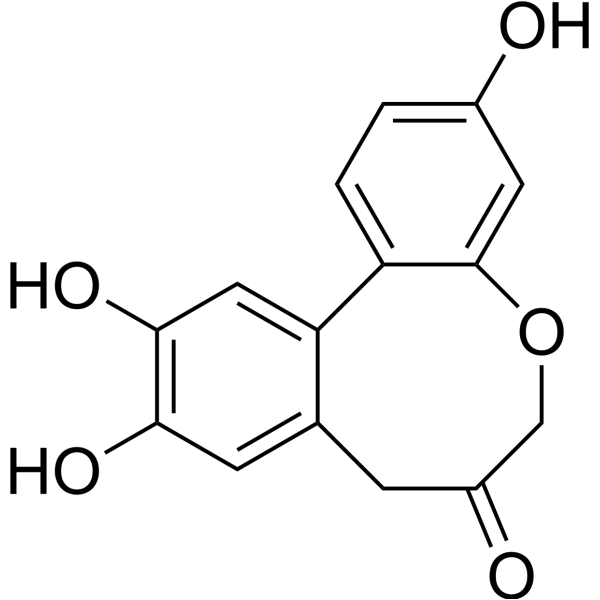
Protosappanin A
CAS No. 102036-28-2
Protosappanin A( PTA )
Catalog No. M29026 CAS No. 102036-28-2
Protosappanin A has anti-oxidative/nitrative activities on brain immune and neuroinflammation through regulation of CD14/TLR4-dependentinflammation signal pathway.
Purity : >98% (HPLC)
 COA
COA
 Datasheet
Datasheet
 HNMR
HNMR
 HPLC
HPLC
 MSDS
MSDS
 Handing Instructions
Handing Instructions
| Size | Price / USD | Stock | Quantity |
| 5MG | 410 | Get Quote |


|
| 10MG | 605 | Get Quote |


|
| 25MG | 954 | Get Quote |


|
| 50MG | 1287 | Get Quote |


|
| 100MG | 1728 | Get Quote |


|
| 200MG | Get Quote | Get Quote |


|
| 500MG | Get Quote | Get Quote |


|
| 1G | Get Quote | Get Quote |


|
Biological Information
-
Product NameProtosappanin A
-
NoteResearch use only, not for human use.
-
Brief DescriptionProtosappanin A has anti-oxidative/nitrative activities on brain immune and neuroinflammation through regulation of CD14/TLR4-dependentinflammation signal pathway.
-
DescriptionProtosappanin A has anti-oxidative/nitrative activities on brain immune and neuroinflammation through regulation of CD14/TLR4-dependent inflammation signal pathway; it exerts anti-neuroinflammatory effect by inhibiting JAK2-STAT3 pathway in lipopolysaccharide-induced BV2 microglia. Protosappanin A induces immunosuppression of rats heart transplantation targeting T cells in grafts via NF-kappaB pathway. Protosappanin A and protosappanin B have antimicrobial activity, they show both alone activities and resistance reversal effects of amikacin and gentamicin against MRSA. Protosappanin A shows strong effect against HIV-1 IN with an IC50 value of 12.6 uM.(In Vitro):Protosappanin A (PsA) and Protosappanin B (PsB) were identified from Sappan Lignum extracts. They showed activity against both S. aureus and MRSA with MIC or MIC50 at 64 (PsA) and 128 (PsB) mg/L alone. When they were used in combination with antibiotics, they showed the best synergy with amikacin and gentamicin with MIC50 (mg/L) of amikacin reduced more significantly from 32 to four (with PsA) and eight (with PsB), and the fractional inhibitory concentration index (FICI) ranged between 0.078 and 0.500 (FICI50 = 0.375). Moreover, the resistance of MRSA towards amikacin and gentamicin could be reversed by the Clinical and Laboratory Standards Institute criteria. The combined bactericidal mode could as well be synergy. PsA and PsB showed very low cytotoxicity in comparison with their promising activity against MRSA.
-
In VitroProtosappanin A (PTA: 12.5, 25, 50 μM, 24 hours) significantly inhibits the production of TNF-α and IL-1β in LPS-activated BV2 microglia. And the mRNA expressions of IL-6, IL-1β, and MCP-1 are reduced by PTA in a dose-dependent manner in BV2 microglial cell line.Protosappanin A (PTA: 12.5, 25, 50 μM, 24 hours) suppresses JAK2/STAT3-dependent inflammation pathway through down-regulating the phosphorylation of JAK2 and STAT3, as well as STAT3 nuclear translocation against LPS treatment.Protosappanin A (PTA: 12.5, 25, 50 μM, 24 hours) shows obvious effect on disturbing the interaction of transmembrane protein CD14 with Toll-like receptor-4, resulting in the inhibition of NF-κB-dependent oxidative and nitrative stress in LPS-induced BV2 microglia. Western Blot Analysis Cell Line:Murine BV2 microglial cell line.Concentration:12.5, 25, 50 μM.Incubation Time:24 hours.Result:Inhibits the releases of NO, TNF-α and IL-1β in LPS-induced BV2 cells.Attenuated IL-6, IL-1β and MCP-1 gene expressions in the LPS-induced BV2 cells. Suppressed JAK2/STAT3 pathway activation in the LPS-induced BV2 cells.
-
In Vivo——
-
SynonymsPTA
-
PathwayMembrane Transporter/Ion Channel
-
TargetNADPH
-
RecptorNADPH
-
Research Area——
-
Indication——
Chemical Information
-
CAS Number102036-28-2
-
Formula Weight272.25
-
Molecular FormulaC15H12O5
-
Purity>98% (HPLC)
-
SolubilityIn Vitro:?DMSO : 125 mg/mL (459.14 mM)
-
SMILESOc(cc1)cc(OCC(C2)=O)c1-c(cc1O)c2cc1O
-
Chemical Name——
Shipping & Storage Information
-
Storage(-20℃)
-
ShippingWith Ice Pack
-
Stability≥ 2 years
Reference
molnova catalog



related products
-
Cozymasei(NAD+)
NAD+ is a coenzyme composed of ribosylnicotinamide 5'-diphosphate coupled to adenosine 5'-phosphate by pyrophosphate linkage.
-
AKR1C3-IN-1
AKR1C3-IN-1 is a potent and selective inhibitor of AKR1C3(IC50 of 13 nM).
-
AKR1C1-IN-1
AKR1C1-IN-1 is a human 20α-hydroxysteroid dehydrogenase inhibitor (AKR1C1,Ki: 4 nM).AKR1C1-IN-1 inhibits the metabolism of progesterone that in AKR1C1-overexpressed BAECs (IC50:460 nM).



 Cart
Cart
 sales@molnova.com
sales@molnova.com


